An entry-level DSLR camera has come a long way in recent years with many wonderful features stolen from more expensive models. This small lightweight DSLR is perfect for budget users needing camera equipment to get a decent quality photo. Easy to operate as well as great value for money. Even the professional photographer likes this compact and simple DSLR camera. If you are looking for a reliable high-end DSLR then dive into our recommended best entry-level DSLR cameras.
DSLRs are a reliable technology that blends familiarity with the most current and up-to-date design available in the world of photography design. The best entry-level DSLR offers considerably more flexibility while photographing and offer more options for all skill levels that most compact cameras cannot match. Below see the best entry-level DSLR cameras for professional photography.
1. Canon EOS 77D / EOS 9000D
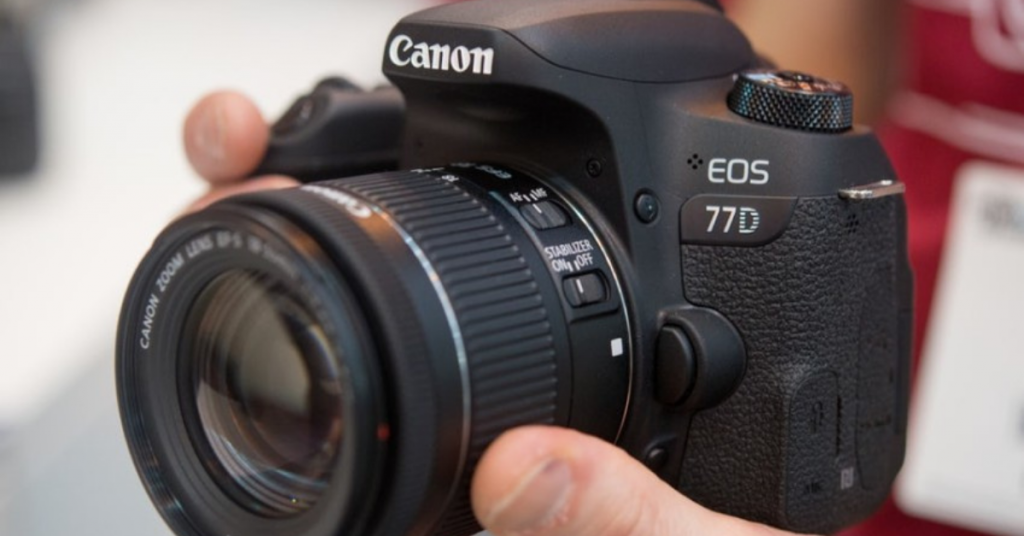
The 77D is Canon’s unofficial successor to the T6. The system contains a 24-megapixel CMOS sensor and DIGIC 7 image processor, a 1080p max video recording at 60. It uses the 45 point cross-type autofocus performance with Canon’s Dual Pixel AF technology that gives smooth and confident focus.
This best entry-level DSLR was the official first camera in the Rebel series that achieved this feature. The battery life is good for the class as of now it is 600 shots. Where these cameras shine is in however the superb user interface which is easily accessible and straightforward that strives to be equally welcoming and friendly to the novice photographer.
Entry-level DSLR cameras provide considerable more flexibility while photographing and offer more options for all skill levels that most compact cameras cannot match. This is an example of a DSLR camera Canon that attempts to provide more welcome for beginner photographers without threatening image quality.
There are elastic holds on one or the other side for your palms and one more at the back for your thumb. This model comes up short on any type of climate fixing however we found that it can deal with a light shower with no fight.
On the left side, we have folds covering the controller terminal, Micro-HDMI port, outer mic attachment, and an old-styled Mini-USB port. The NFC contact point for blending is also positioned here.
The mode dial is put on the upper left of this entry-level camera with a locking framework and a force switch that allows you to hop directly to video mode. The viewfinder utilizes a pentamirror to mirror light from the focal point to the viewfinder as opposed to a pentaprism, which is for the most part heavier and more costly to carry out.
We have a hot shoe terminal and an underlying spring-up streak over the viewfinder. An infrared sensor winds down the LCD when you bring the digital camera up to your eye.
Pros of Canon EOS 77D / EOS 9000D:
- 24MP APS C CMOS sensor with Dual Pixel autofocus
- Digic 7 processor
- 6fps continuous shooting speed
- Top plate LCD
- Good camera
- 3″ fully-articulating touchscreen
- 1080/60p video capture
Cons of Canon EOS 77D / EOS 9000D:
- Plasticky finish
- No 4K video
2. Canon EOS Rebel T7 / EOS 2000D
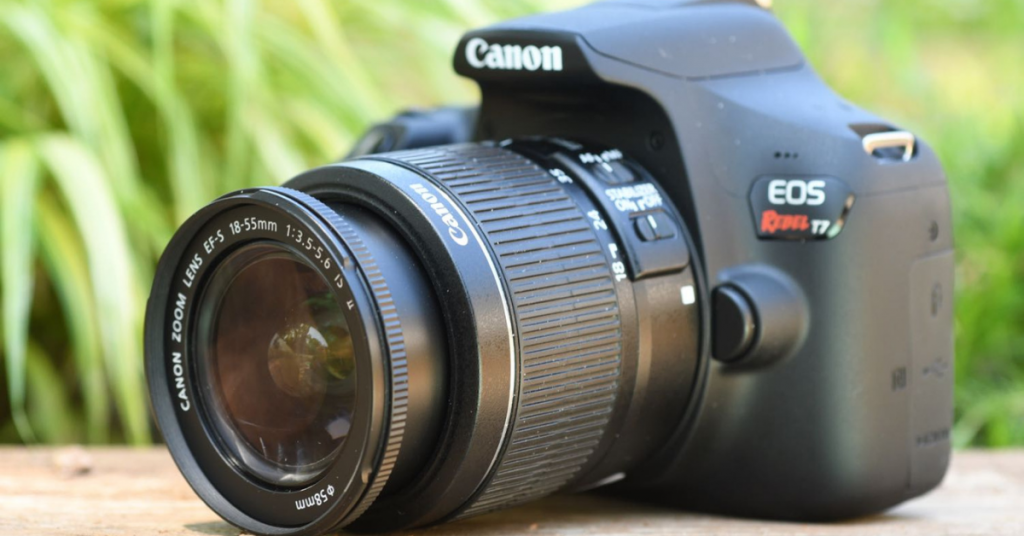
Another best entry-level DSLR camera features 3 frames per second of photography and a reflex-focus system. It doesn’t have a screen to reposition the picture and no tilt screen for photographing with a difficult angle. It is the greatest of all the cameras.
The Canon Rebel T7 is the best camera for landscape photography. Its picture quality is awesome, as you shouldn’t see much coarseness even at high ISO levels to make up for helpless lighting. Its pack focal point offers a tolerably adaptable zoom range, however shows extreme light falloff, implying that the edges of your picture are probably going to be a lot hazier than the middle point.
The DIGIC 4+ processor is a similar picture processor that Canon utilized in the past 1300D model, beginning to show its age. In any case, the affectability sits at ISO100-6400 and can be extended to 12800.
The 9-point AF framework is incorporated, as opposed to the fresher Dual Pixel framework, which is phenomenal for centering live perspectives. In any case, a standard passage DSLR positively manages its work. An element that might be a disadvantage for some is the flush 3-inch show screen which is utilized rather than a more current touchscreen alternative.
This isn’t exactly up to the norm of the most recent 4K capacities, however, full HD video recording is logically adequate for most clients.
With regards to availability, clients advantage from NFC and WiFi associations. Notwithstanding, there is no low-power Bluetooth network accessible, which is frustrating as it is beyond the realm of imagination to expect to keep a steady association with cell phones.
Pros of Canon Rebel T7 / EOS 2000D:
- Superb image quality
- Comfortable ergonomics
- Simple controls
- One of the best entry-level DSLRs
- interchangeable lens camera
- Decent battery life
- Excellent camera for beginners
- Easy to use
Cons of Canon Rebel T7 / EOS 2000D:
- No support for 4k recording
3. Canon Rebel T7i / EOS 800D
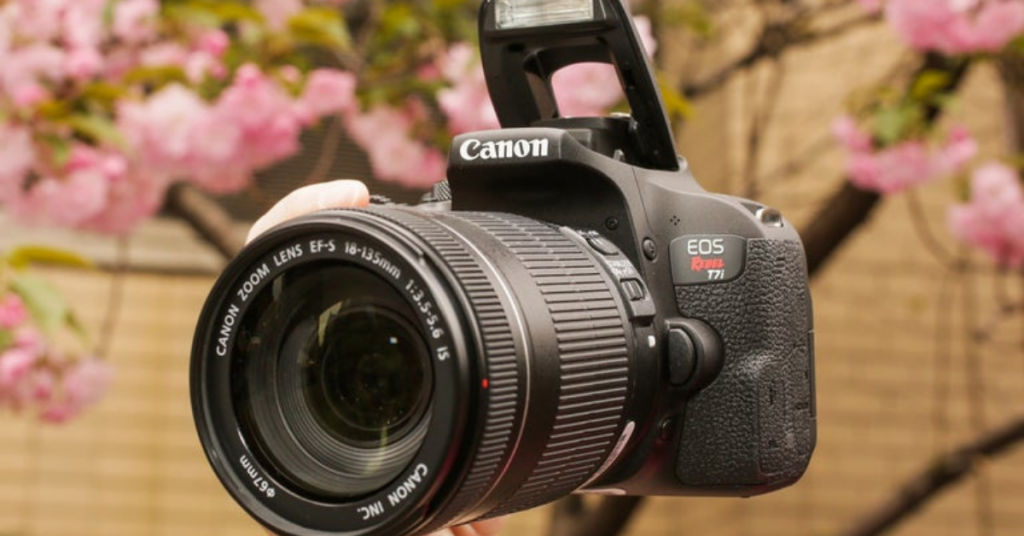
This latest and best entry-level DSLR from Canon has a 24.2-megapixel sensor, a dual-camera system, and an integrated DIGIC 7 camera. It uses a 45 – point cross-type AF system and the popular Dual Pixel CMOS AF, a similar setup with the 77D. The camera includes a 3.0 fully articulated touch screen, audio, and wifi connectivity.
It generally inherits many of the capabilities and functions from Canon as the High-End 80D. It is affordable despite its price making it attractive for the beginner. the Canon Rebel T7i is very simple to utilize, however it isn’t awesome.
Even though it is not unexpected truth of entry-level DSLR cameras, the T7i just has a single dial that you can use to change settings. This makes the camera fairly more awkward to utilize, particularly when in manual mode.
It isn’t like other passage level DSLR cameras are any better, for example, the contending Nikon D5600, however some mirrorless models around this value range do have a subsequent order dial. If Canon at any point includes this component as a section-level DSLR, it would be an exceptionally welcome sight. So it is considered the best camera by the international media group.
As far as climate fixing, the T7i certainly doesn’t have Canon’s best quality assurance from the components. You ought to have the option to utilize the T7i in the light downpour with no issues, yet I wouldn’t have any desire to unload it in the tempest. This is more out of a bounty of alert than whatever else; even DSLR cameras without climate fixing do shockingly well in intense conditions.
Pros of Canon EOS Rebel T7i / EOS 800D:
- User-friendly interface
- 24MP APS-C CMOS sensor
- Excellent touchscreen control
- Live View AF performance
- Impressive overall image quality
- 6fps continuous shooting speed
Cons of Canon EOS Rebel T7i / EOS 800D:
- Video limited to 1080p
- Dynamic range could be better
4. Panasonic Lumix FZ80
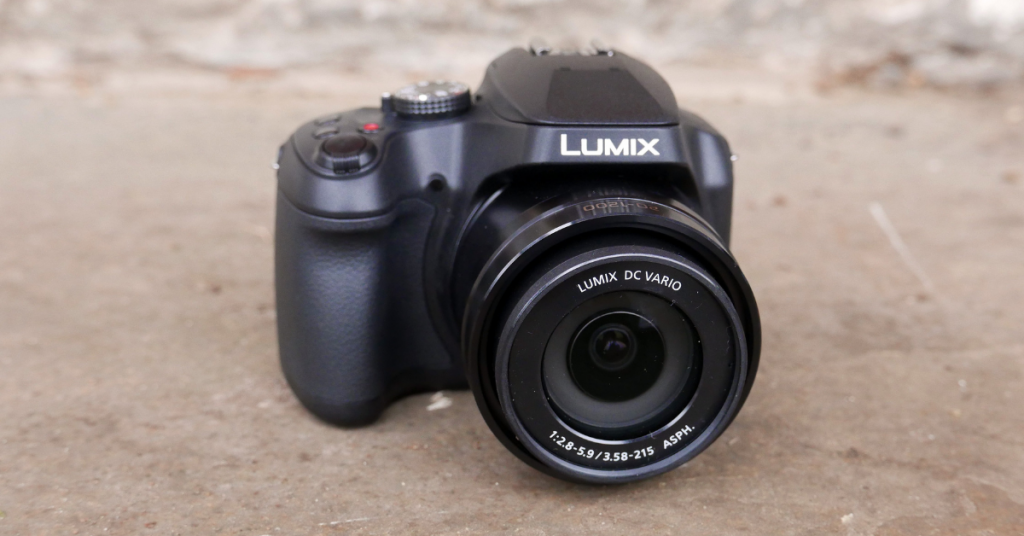
The Panasonic FZ80 has comparable styling with its archetype, the FZ70. It is an SLR-styled superzoom camera that offers a huge 60x optical zoom range, implying that it’s anything but a minimal camera. The FZ80’s measurements are around 5.1 x 3.7 x 4.7 inches (130 x 94 x 119 millimeters) and it weighs 21.7 ounces (616 grams) with a card and battery, which is somewhat more limited and somewhat heavier than its archetype.
The Panasonic FZ80’s controls are very acceptable generally speaking, and the touchscreen interface performs pleasantly. The screen discharge feels fine and the zoom flip changes up the delivery functions admirably. The FZ80 just has one control dial, yet it’s pressable which permits it to rapidly change capacities.
For instance in manual openness mode, you can switch between controlling the shade speed and the gap by basically tapping the dial. You can likewise squeeze it change to/from openness pay in gap or screen need mode.
The implicit electronic viewfinder is a 0.2-inch shading LCD with 1,166k dabs and roughly 100% inclusion. The 35mm identical amplification of the EVF is just 0.46x – still helpful, however, it’s little, as is good enough for this class of camera. There’s no inherent eye sensor, but instead exchanging between the EVF and the back show expects you to press a button to one side of the EVF; which is troublesome when needing to shoot through the EVF and audit pictures on the back show.
This best entry-level DSLR has an 18.1 megapixel and also has a long 20-1200mm LUMIX DC VARIO lens. The light and shiny F2.8-5.9 aperture range have been optically stabilized by Panasonic using the POWER OS system POWER. Customers love this low-cost DSLR camera because of its low-light capabilities. It’s possible to capture high-speed motion in 4:2 resolutions with high-quality video camera technology. You also gain creativity via post-focus stacking for changing the depth of field and focus points.
Pros of Panasonic Lumix FZ80:
- Huge 60x zoom range
- Fast autofocus
- 10fps Raw capture
- 30fps 4K Photo capture
- Amazing low-light performance
- Touch LCD
- Good native lenses
- Great image stabilization
Cons of Panasonic Lumix FZ80:
- Limited Raw buffer
5. Canon EOS 6D
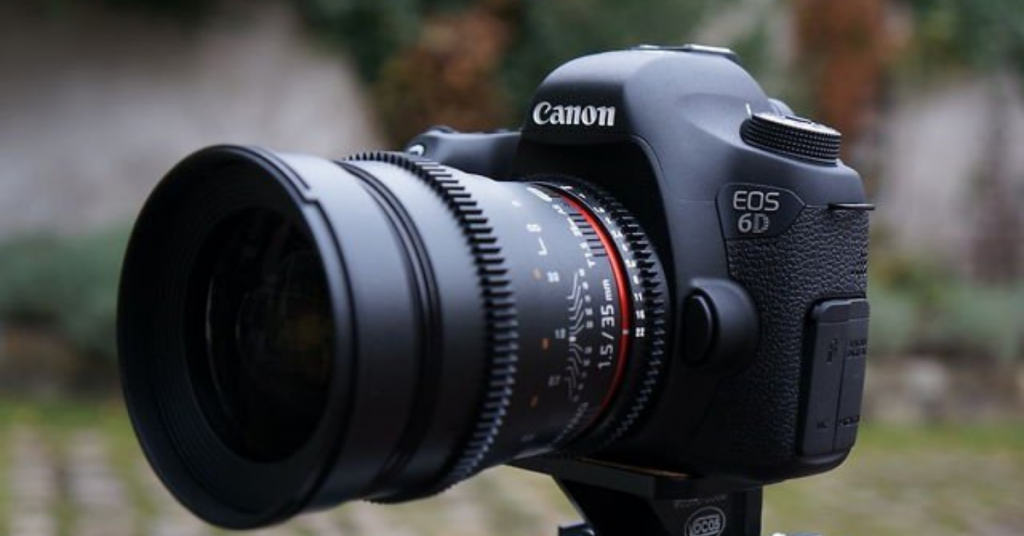
The Canon EOS 6D is a 20-megapixel digital camera with a full camera CMOS sensor and the Canon lens. Compared to competitors it is very good quality and there are also many advanced features. A constant shutter rate of 4.5 frames/ seconds is good enough for most situations. Built-in Wi-Fi to speed image transmission and remotely control using Canon’s iOS and Android app; and built-in GPS.
It includes an Optical Low Pass Filter and the DIGIC 5+ picture processor. While it’s not a similar 22.3MP sensor utilized in the 5D Mark III, the entry-level DSLR camera figures out how to keep up with a magnificent resolution and settling capacity in the RAW format. In general, picture quality, notwithstanding its age, stays remarkable. Its 14-piece RAW pictures are sensibly sharp to the present principles with a great difference and a satisfying tone. The tones give solid resonance normal and exact delivering.
Low light execution is magnificent and straightforwardly tantamount to the Canon 5D Mark III. Furthermore, it shows generous enhancements in high ISO testing over the active 5D Mark II. The camera gives a local ISO range from ISO 100 to 25,600, which is further expandable to ISO 102,400. Also, clients can expect usable pictures up to ISO 6,400 or 12,800.
It includes an 11-point autofocus system, where the middlemost point is cross-type viable. One of the promoted highlights of this camera is its capacity to shine in incredibly low light. For this situation, that is – 3 EV. At the hour of delivery, that was a class-driving element, and today, it still outcompetes most cameras at this cost.
By and large, self-adjusting execution, even in low light, is superb. Furthermore, the camera is appropriate for night photography or occasion work where faintly lit scenes are the standard. For the following activity, while the camera doesn’t have Zone AF like the 5D Mark III, it performs well in any case. Furthermore, self-adjusting no matter how you look at it is quick, reliable, and exact.
Pros of Canon EOS 6D:
- Enthusiast-centric controls
- Remote control via Wi-Fi
- GPS technology
- High image quality
- Interchangeable lenses
- Single-axis electronic level
- Silent shutter mode
Cons of Canon EOS 6D:
- No flash
- Lacks some connections
6. Canon EOS Rebel T8i/EOS 850D
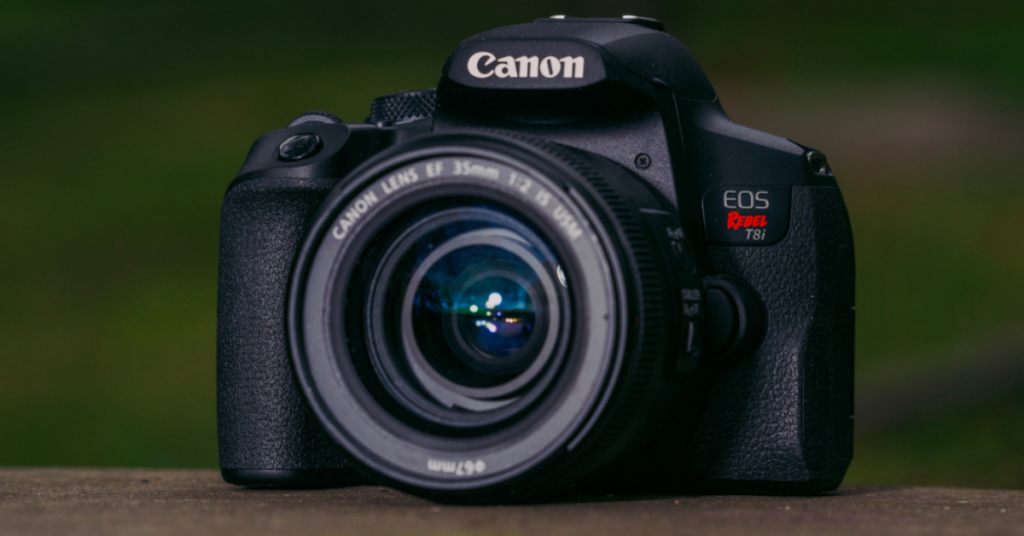
Canon has developed the 24mp Rebel T8i DSLR that includes a 24MP aperture lens and is optimized for shooting at an APS-C (25.3 x 14.8. It’s also called the EOS 850D or the Kiss X10-i in some countries and the newer model of Canon’s Rebel T7i. It is one of the best entry-level DSLR cameras.
The EOS Rebel T8i, as it’s known in North America or the 850D in Europe, is their most exceptional Rebel yet. Released in the spring of 2020, it’s their leader mid-range DSLR camera. What’s more, it comes to advertise three years following the arrival of the prior T7i. As the leader of the Rebel series, it sits just underneath the EOS 90D and closes by the mirrorless M6 Mark II. What’s more, it’s a camera that Canon focuses on the fan hoping to update from a section-level DSLR or easy-to-use camera.
The overall picture quality is excellent of this best entry-level DSLR. The continuous shooting speeds are good. The intuitive touch screen is an excellent feature of a dual pixels camera with image recognition features and the focusing in live view is easy. The added AF points would help keep the camera moving in the center of your subject.
It offers generally indistinguishable capacities as the SL3, however these address a generous improvement over the T7i. For this situation, it presently shoots 4K UHD 24 FPS video, notwithstanding 1080p Full HD 60 FPS video. So it is a great camera for video shooters. What’s more, it does as such to the MP4 design with H.264 and IPB (standard) pressure. This digital camera additionally records recordings utilizing 8-bit 4:2:0 shading with information paces of 120 Mbps for 4K and 60 Mbps for 1080p.
It utilizes a similar LP-E17 battery as the T7i. Notwithstanding, with the refreshed DIGIC 8 processor comes gigantic upgrades in battery life. Furthermore, Canon currently rates the camera to convey 800 shots for every charge or 2.5 long stretches of video recording. Furthermore, this is a 33% improvement, making battery life brilliant for a buyer DSLR.
Pros of Canon EOS Rebel T8i/EOS 850D:
- Quick, reliable autofocus
- Vari-angle touchscreen
- Excellent battery life
- 7.5fps continuous shooting speed
- Good image quality
- Records 4K video
- Good guides for newbies
Cons of Canon EOS Rebel T8i/EOS 850D:
- Small viewfinder display
7. Canon EOS Rebel SL3 / 250D
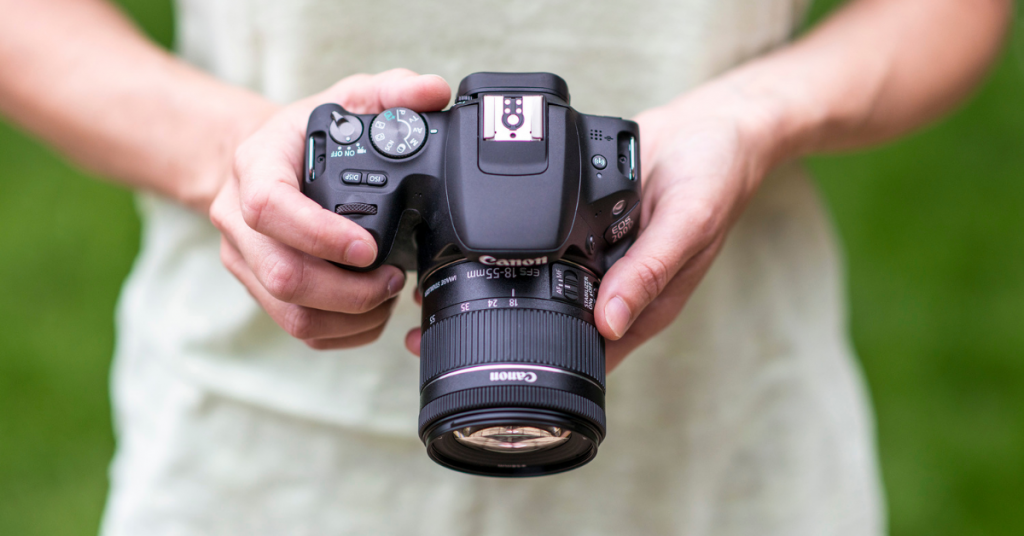
The Canon EOS 250D, known as the EOS Rebel SL3, is intended for fledgling picture takers, nonetheless, it has somewhat more to bring to the table than the Canon EOS 2000D (EOS Rebel T7) and EOS 4000D.
This best entry-level DSLR has an APS-C sensor, 4K video innovation, and a vari-point touch screen. Also, this entry-level DSLR camera can get subjects sharp rapidly and catches alluring pictures with a decent degree of detail. Truth be told, it’s the best entry-level DSLRs around right now. However, numerous novices are ideally serviced by a mirrorless camera.
As it’s an SLR, the Canon EOS rebel SL3 has two self-adjust frameworks. In live view mode, when the picture is made on the fundamental screen, the 250D uses the Dual Pixel CMOS autofocus system. This has stage recognition pixels installed in the imaging sensor.
Utilizing the screen endlessly extends the quantity of centering focuses accessible for determination. The camera can pick between 143 AF focuses consequently, yet there are 3,975 focuses accessible for manual determination. Moreover, you can choose the one you need to use with a tap on the screen.
The Canon EOS rebel Sl3 is lightweight and small but the ergonomic grip is firm. The SL3 has a very well-equipped touchscreen computer LC with all the tilt and rotate options for easy composition. The 24-millimeter digital imaging sensor is Canon’s latest.
Camera users will rejoice also when they learn that the SL3 features Dual pixel autofocus – the cheapest Canon entry-level DSLR camera that also includes it. Compared to Nikon’s D3500 it features the tilt and flip feature in 4K video and dual-lens AF, a feature that helps when watching a video. The current SL3 selling for 650 is $750, plus a kit lens which is a little more than you may think.
Pros of Canon EOS Rebel SL3 / 250D:
- Compact
- 5fps continuous shooting
- Vari-angle touch LCD
- Good APS C sensor
- 1080p video
- Good autofocus
- The ideal camera for beginners
- Wi-Fi and Bluetooth
Cons of Canon EOS Rebel SL3 / 250D:
- The kit lens could be better
8. Pentax K-70
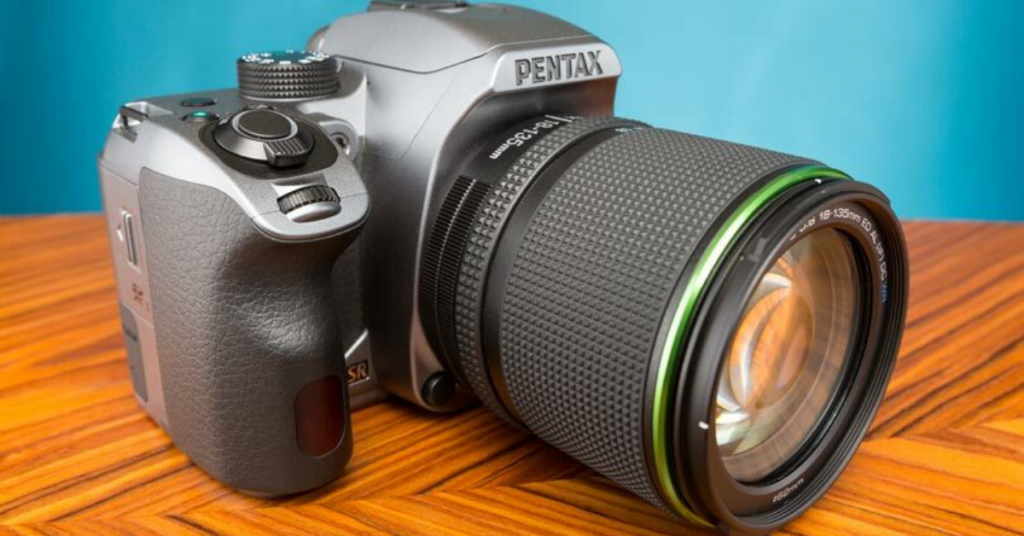
The Pentax K-70 is another mid-range 24.24-megapixel DSLR camera. It is one of the best Pentax cameras. Key components incorporate a 24-megapixel APS-C sensor with an associating test system as opposed to an optical anti-aliasing channel, a vari-point LCD screen, 11-point SAFOX X Hybrid autofocus system, climate-safe construction, ISO range of 100-102400, 1080p max video at 30, 25, and 24fps, 6fps persistent shooting, Pixel Shift Resolution System, AA (hostile to associating) channel test system, High Dynamic Range mode, and scope of in-assembled advanced filter impacts.
The K-70 offers a screen intended for 100,000 deliveries, top shade speed of 1/6000th second, 77-section lattice meter, dust evacuation, and camera shake-decrease frameworks, underlying wi-fi network, 14-piece RAW records, and a clock openness mode.
The Pentax K-70’s is remotely like its 3-year-old archetype, the K-50, the more “surprising” styling of that entry-level DSLR camera has been supplanted with a squarer-edged look. The Pentax K-70 is comparable in size – 93(H) x 125.5(W) x 74(D) – and marginally heavier – 628g without the battery and memory card fitted.
Regardless of everything plastic development, the K-70 feels pretty strong, and it’s likewise residue, cold, and water-safe, on account of an arrangement of uncommon seals utilized all through the plan, implying that it can work at.
There’s additionally far-reaching residue and dampness safe fixing all through the Pentax K-70’s plan, and that is doubly amazing when you think about that as a slant/turn LCD screen is incorporated. In addition to that, there are additionally twin control dials that make changes to the principle openness factors very fast and instinctive.
Pentax’s K-70 offers up a 24 MP camera with 11 views, auto-focus, and 8 fps shooting. It even has a hybrid autofocus system for a live view similar to Canon. The camera is rugged and easier to handle but lighter than the Nikon and Canon Rebel SL3 cameras. The Pentax could be the best for landscape photographers that care more about build quality.
Pros of Pentax K-70:
- 24MP image sensor
- Vari-angle display
- Weather-sealed design
- Shooting video at 30, 25 and 24fps
- Pentaprism viewfinder
- Strong APS-C lens library
- Hybrid live view autofocus
- Great image stabilization
Cons of Pentax K-70:
- Kit lens performance is not well
9. Panasonic Lumix G100
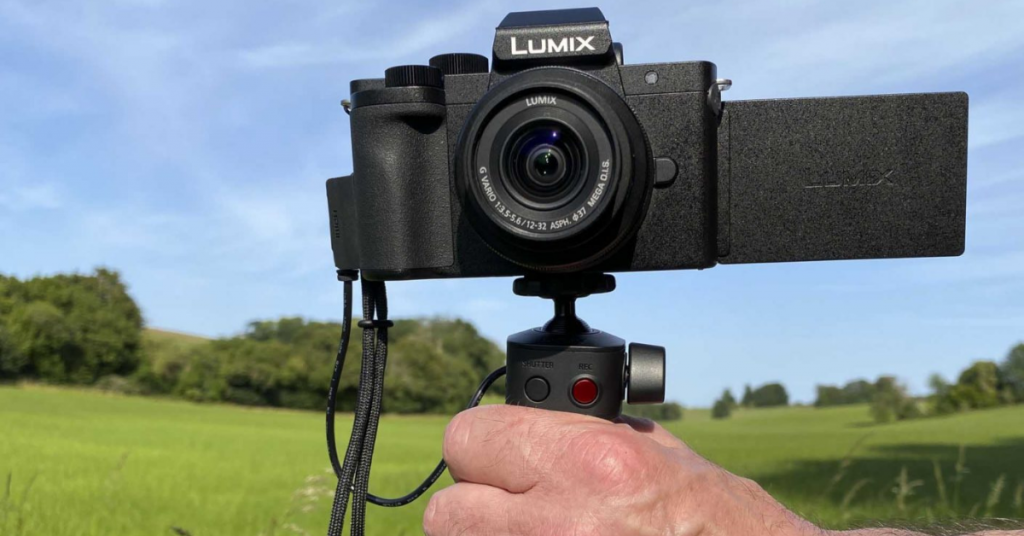
The Panasonic V-Shot camera is really good in still shots too. The Lumix G100 will delight photographers as well as videographers. Its approachable button layout enables the recording of quality audio/video footage.
Even someone not interested in the technical aspects of spotting great videos will have a chance to improve. Panasonic provides a significant advantage against competitors in a highly competitive environment. This is an excellent entry-level DSLR camera if you want to start vlogging instead of photography or something similar. The G100 is an effective viewfinder and is ergonomically designed.
The Lumix G100 is one of the best mirrorless cameras around, however packs a good list of capabilities with an implicit viewfinder, completely expressed side-pivoted screen, outside mic input, and a cunning underlying three-mic framework.
Panasonic might be pitching it basically at vloggers, yet it additionally makes for an exceptionally decent minimized universally useful entry-level DSLR camera that can take various focal points. Shooting in 4k likewise brings about a tight harvest even without adjustment, making it inadmissible for vloggers or individuals who like to see a greater amount of their environmental factors.
Concerning self-adjust, the G100 was acceptable, unquestionably better than the Canon G7X, however not as sure as opponents with stage distinguish or Dual Pixel AF, so be cautioned if you appreciate moving to and fro when recording. That’s why it is considered the best camera for people.
For great vlogging and video creation, I feel the more certain AF, useful 4k, and longer recording cuts make the Sony ZV-1 ideal. But, as an all-rounder, the G100 is more enticing with its viewfinder and opportunity to switch focal points. Do anyway watch out for the cost of the Lumix G90/G95 as it gives you IBIS, limitless recording, an OLED viewfinder, earphone jack, and a more adaptable pack zoom for not significantly more. Canon’s EOS M50 additionally stays a convincing decision for vloggers with brilliant self-adjust since you disregard 4k.
Pros of Panasonic Lumix G100:
- Micro Four Thirds Lens Mount
- 10fps continuous shooting speed
- 4k video
- Wi-Fi and Bluetooth built-in
- ISO range from 100 to 25600
- 3inch vari-angle touch-screen
Cons of Panasonic Lumix G100:
- Slightly more noise
10. Nikon D5600
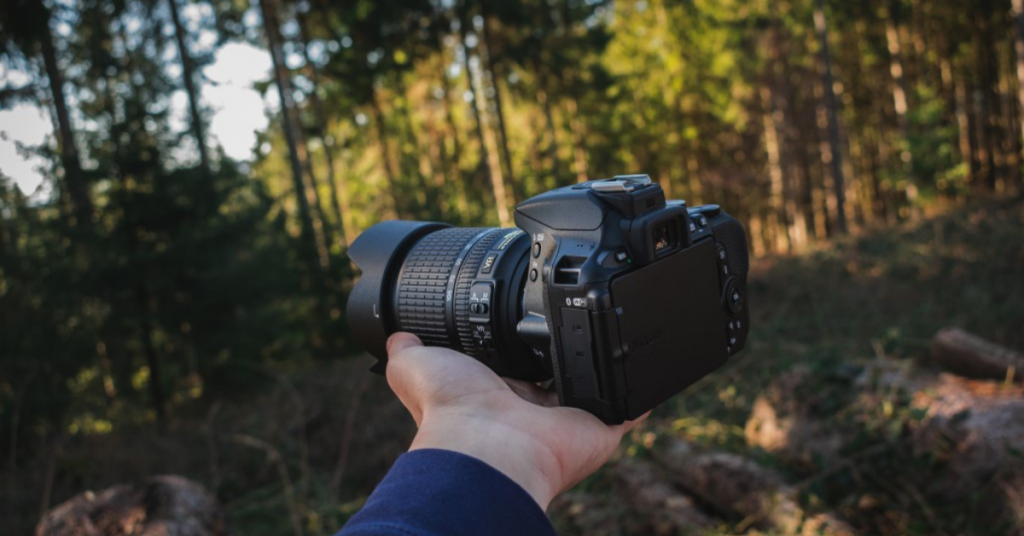
In mid-2015, Nikon presented their littlest and lightest DSLR to date as the Nikon D5500, which consolidated an awesome 24-megapixel APS-C sensor with an articulating touchscreen show. We were exceptionally intrigued with the passage level DSLR so when Nikon declared its replacement, the D5600, we were intrigued to perceive what redesigns Nikon would bring to section to mid-level market.
The appropriate response ended up being something of a hodgepodge. The expansion of Nikon SnapBridge might be a significant move up to a few however to other people, the sharing provisions aren’t seasoned enough for redesigning. While there may not be a ton of motivations for D5500 proprietors to jump on the D5600, for clients hoping to buy their first DSLR, the D5600 addresses a phenomenal worth and is extraordinary by and large entertainer.
The camera’s profound handgrip is agreeable and secure, in any event, for one-gave shooting. The Nikon D5600 offers a sizable amount of outside controls to make delving into the menu framework pointless past whenever you first set up this entry-level DSLR camera. Particularly helpful is the “I” fast menu include, which awards admittance to every one of the significant camera settings, from picture quality to ISO and then some.
The viewfinder is sufficiently enormous and brilliant for a camera in this class. You can without much of a stretch view shooting information, like data about shade speed and opening, at the lower part of the edge. Yet, the viewfinder covers something like 95% of what the camera catches in a shot.
Pros of Nikon D5600:
- Small size
- Good Live View performance
- External mic support
- 1080p60 max video capture
- Great image quality
- The ideal camera for beginners
- 39-point AF system
Cons of Nikon D5600:
- Cramped controls
11. Canon EOS Rebel T100 / EOS 4000D
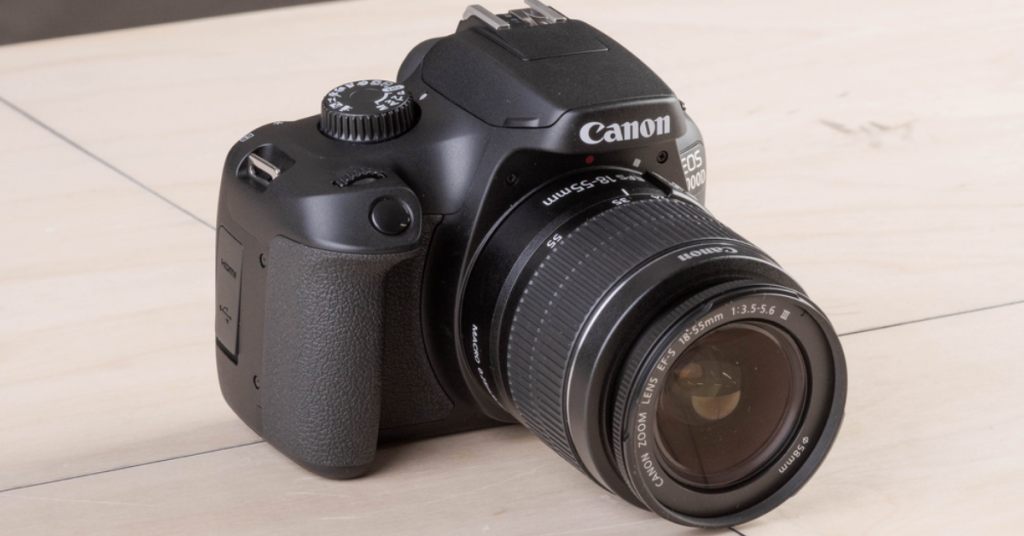
The Canon’s Rebel T100 is a simple entry-level DSLR camera that comes with great features. It boasts an 18-megapixel CMOS sensor DIGIC 4+ image processor 1080p full HD max Video up to 30 FPS. It uses a 9-point system that is cross-type compliant with the center post of the post. Average battery life for the class at 500 shots a charge.
This DSLR is one of Canon’s lightest SLR and weighs 436 grams with installed batteries and an SD card. The camera is also supported by Canon Creative Auto mode, which allows users to simply slide sliders to change background blur.
The Canon Rebel T100 is incredible for landscape photography. It offers extraordinary picture quality, with a high unique reach, great shading precision, and low degrees of graininess even at a high ISO range, which is incredible for evening-time shoots.
Its fundamentally plastic development doesn’t feel particularly durable and isn’t evaluated as being climate fixed, however, we don’t right now test for that. It’s likewise essentially bulkier than point-and-shoots or smaller exchangeable focal point mirrorless entry-level cameras that can be put away in a pocket or a pocket.
Its faint fixed screen can likewise be somewhat of a test to see under direct daylight, and keeping in mind that its unit focal point allows in a lot of light, it shows perceptible light falloff that makes the sides of a picture hazier than its middle.
Pros of Canon EOS Rebel T100 / EOS 4000:
- Easy to use
- Logically laid-out controls
- Low price
- Decent battery life
- Great image quality
- Fairly good shutter speed range
Cons of Canon EOS Rebel T100 / EOS 4000:
- No touchscreen
12. Canon Rebel T6i / 750D
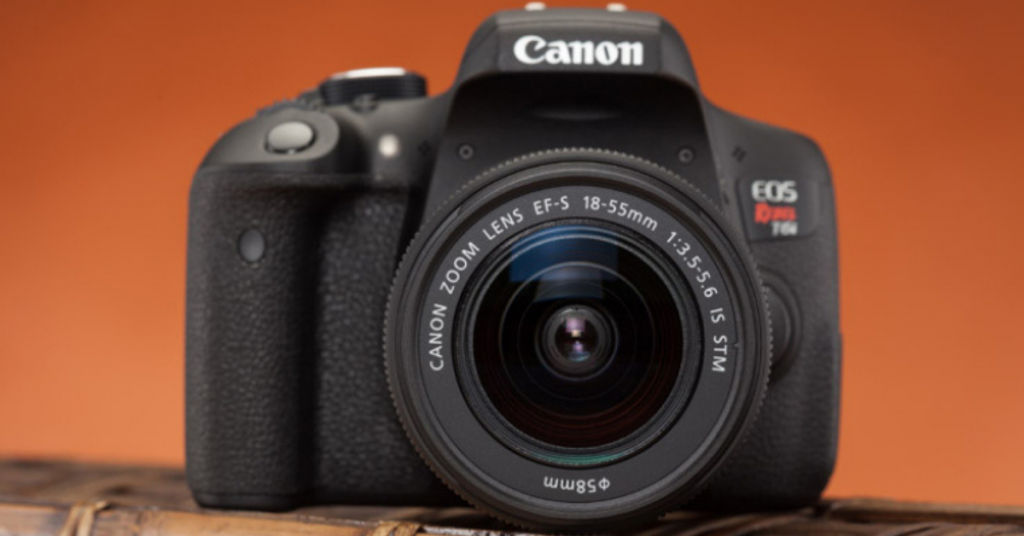
The Canon EOS Rebel T6i/750D conveys proficient grade picture quality in a reduced, lightweight, highlight-filled, simple to-utilize body that conveys a truly reasonable sticker price. These are the characteristics that have secured the leader Canon Rebel model in the top-selling entry-level DSLRs classification for quite a long time and this design approach has proceeded with the Rebel T6i.
However, the T6i is the move up to the earlier lead Rebel model, the T5i, another flagship Rebel model that openings over the T6i have been all the while presented.
In photograph quality, it doesn’t contrast well and contenders, yet except if you make next to each other correlations you most likely will not notice or care. It’s quicker than past models, both for the viewfinder and back-show shooting, and gains Wi-Fi availability, the two of which make it more alluring than its archetype and worth a look in case you’re considering overhauling from a more seasoned model.
However they have eminently unique body plans, the T6i/750D and its more costly kin the T6s/760D are eventually just somewhat unique. The T6s’ controls and format are intended to speak to a better quality picture taker, with cutting edge shows like a top status LCD, lockable mode dial, and a lockable control dial on the back, with ideally less modest inclination buttons.
Pros of Canon Rebel T6i / 750D:
- 24MP APS-C format sensor
- Great touchscreen
- Wi-Fi and NFC built-in
- Vari-angle screen
- Excellent image quality
- Max video (HD) at 30fps
Cons of Canon Rebel T6i / 750D:
- No Bluetooth
13. Canon Rebel T6 / EOS 1300D
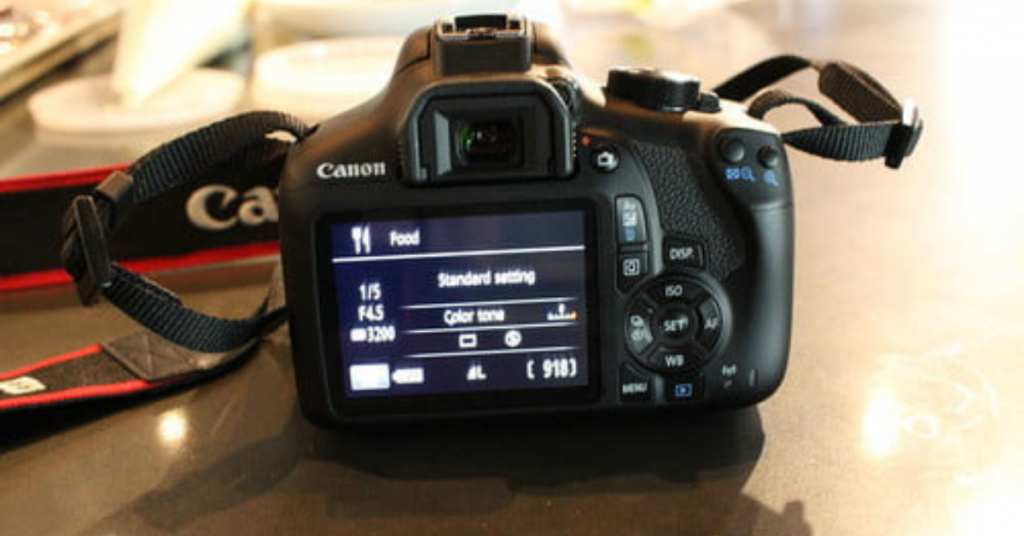
This entry-level camera guarantees unassuming execution in low light. The ISO range looked very restricted contrasted with the new companions on the market. A few different elements are the same as the Rebel T5, i.e., the camera has a similar unassuming 9-point self-adjusting framework and a 95% inclusion of the optical viewfinder.
One significant redesign that the camera got is the LCD of 3-inch with a 920k-spot unit. This update will guarantee a wonderful encounter while seeing pictures and menus. The video-calling highlight is presented in full HD, and you can have manual control of the video with different edge rates accessible, i.e., 30, 25, and 24fps.
This entry-level DSLR camera also gives a few shooting modes that incorporate self-loader opening need, screen need, and the capacity to shoot in the crude arrangement. This new camera houses an inbuilt Wi-Fi and NFC availability. You have a simple way of associating with different contraptions and offer your pictures when you click them. Another positive component is a liberal battery life of 500 shots. You can go through the day shooting without requiring any re-energize.
Pros of Canon Rebel T6 / EOS 1300D:
- Good value
- Wi-Fi and NFC connectivity
- Easy to use
- High-resolution screen
- Better low light performance
- The ideal camera for beginners
- Raw capture support
- On-screen shooting guide
Cons of Canon Rebel T6 / EOS 1300D:
- Dated image sensor
14. Nikon D3500
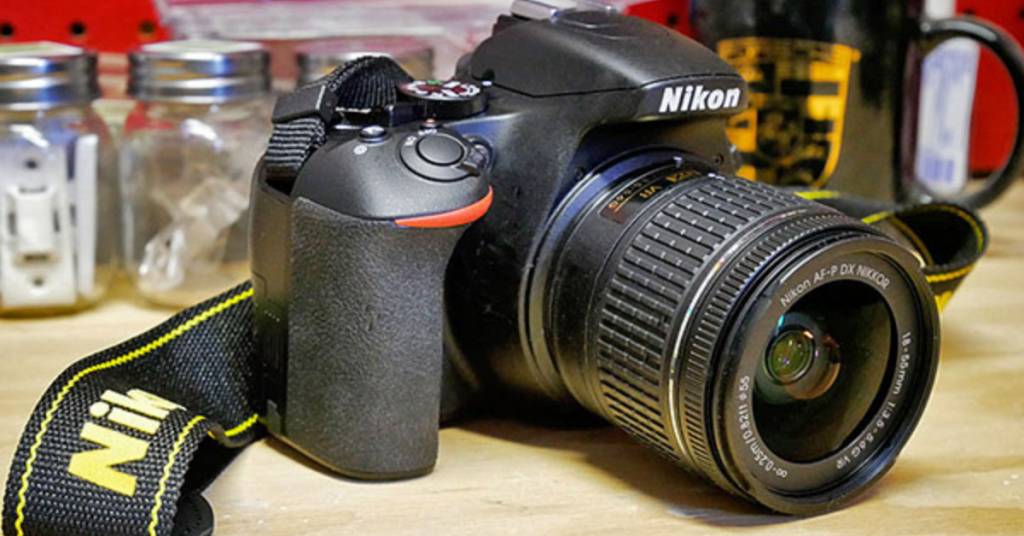
The Nikon D3500’s 24-megapixel sensor is one of the most incredible APS-C crop sensors available. Maybe it’s even awesome, however, various other Nikon and Sony entry-level cameras have a similar sensor.
No, the compromises on this camera come somewhere else. The Nikon D3500 simply doesn’t have many fancy odds and ends; its rear LCD screen doesn’t have a slant flip part, and it’s likewise not a touchscreen. The Nikon D3500’s self-adjust framework, outline rate, and video particulars fall behind those of different cameras today.
Finally, the D3500’s camera body simply isn’t pretty much as cutting edge as certain masters might normally like. For instance, it just has a single order dial and no devoted AF-On button.
The hold is sensibly profound, and surprisingly those with scoops for hands will have no issue tracking down an agreeable grasp on the camera. The elastic cover on the grip isn’t the final say regarding extravagance however basically this isn’t a camera that will get out of your hands. While we’re on form quality, neither the battery nor memory card entryways feel especially bomb-verification, it merits ensuring they’re safely shut before stuffing the D3500 in a pack.
Pros of Nikon D3500:
- All-round image quality
- Great camera for beginners
- Responsive autofocus
- 5fps continuous shooting
- Remarkable battery life
- Affordable
Cons of Nikon D3500:
- No 4K video
- No mic input
15. Panasonic Lumix GX9
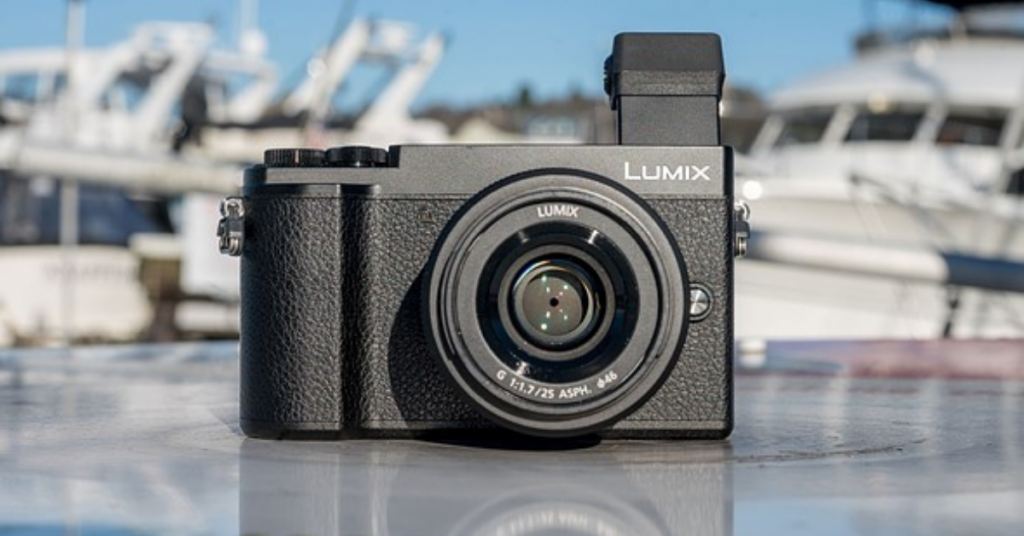
The design of the Panasonic Lumix GX9 is attractive and marvelous. It accompanies a 20 megapixel Four Thirds sensor and its champion element is a shifting electronic viewfinder that is truly helpful, however not without its caveats.
The GX9 is assembled and accompanies a hearty and adaptable exhibit of controls. Extraordinary JPEG tones and the expansion of an L. Monochrome D setting (essentially, a high-contrast high contrast mode) will be fun and valuable for clients that want great pictures without preparing Raw records – however, the GX9’s Raw documents are decent, as well.
Proceeding with the control contrasts, the video record button presently sits inside the force switch, and there’s another blaze button just to one side of the AF/AE lock button on the back deck. What’s more, as though that wasn’t bounty, there’s a new popup streak. (But, a somewhat feeble one with an aide number of only 6 meters at ISO 200, identical to 4.2 meters at ISO 100.)
Pros of Panasonic Lumix GX9:
- Small body with tilting EVF
- In-body stabilization
- Tilting touch LCD
- Pop-up flash
- 4K video
- Wi-Fi + Bluetooth
Cons of Panasonic Lumix GX9:
- Small rear control dial
FAQs
Which DSLR is best for beginners?
The Nikon D3500 has come a long way in recent years with many wonderful features. This small lightweight DSLR is perfect for budget users needing great camera equipment to get a decent quality photo. Easy to operate as well as great value for money. Even the professional photographer likes this compact and easy-to-use camera.
Is Canon or Nikon better for beginners?
Canon is a popular camera brand and dominates the DSLR market. Nikon also has excellent options and great focus points. The best camera depends on your taste and your preferences. Both manufacturers make a good collection of beginner easy-to-use DSLRs. However, both brands are ideal for beginners.
Which is the best entry-level DSLR camera in India?
The EOS Rebel T7 is the best entry-level DSLR featuring a 24.1 Megapixel CMOS sensor and range ISO 100-6400. A beginner rejoices as he can take his photography to another level with faster autofocus, built-in wireless connectivity, and many more. You can take high-quality images for sharing with the world, even low-lighting photos. The EOS Rebels T7 is the latest incarnation and has an ISO Range between 100 and 6400.
Final Words
DSLRs are providing a good photography experience for many photographers. Research every brand of your choice before selecting one. Doing this ensures you’ve found the best camera for your needs with no long-term cost.
